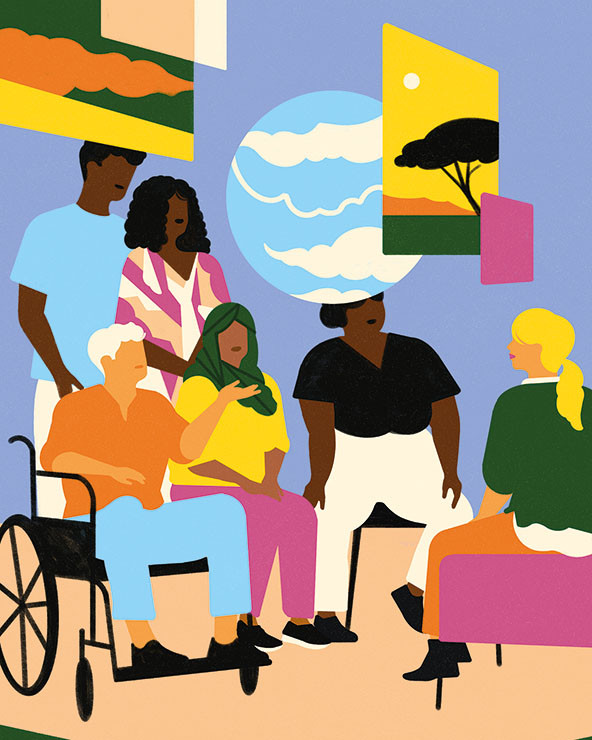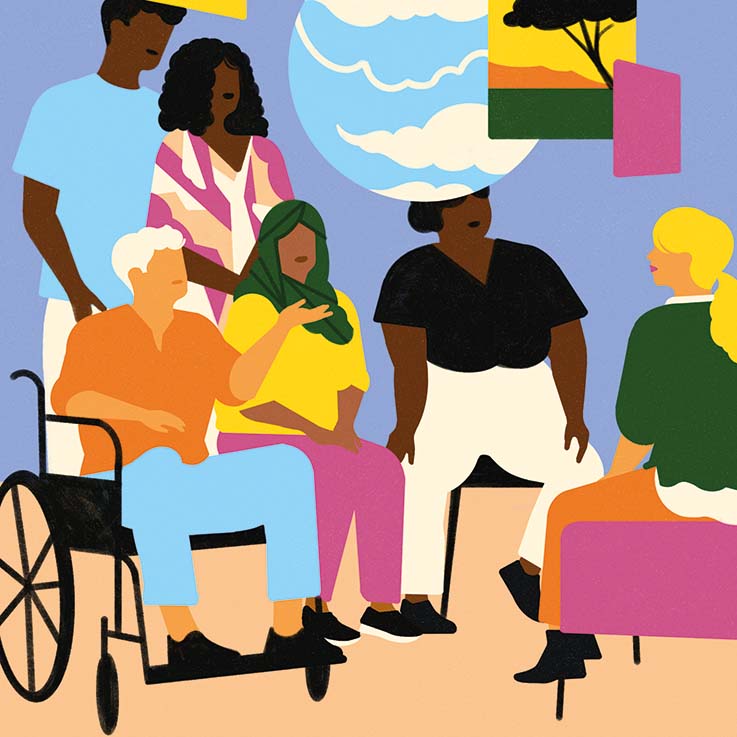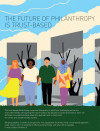
(Illustration by Andrea Mongia)
Our work is just not serving communities in addition to we expect. This might not be the message you’d count on from a corporate-social-responsibility chief. However we’re fooling ourselves if we expect we are able to perceive and handle advanced, multifaceted social challenges in the identical method an organization approaches placing extra cell telephones or hamburgers within the palms of consumers.
The Way forward for Philanthropy Is Belief-Primarily based
The trust-based philanthropy motion has grown in fast time, however there are nonetheless fundamental misunderstandings about this method and its daring imaginative and prescient for a extra simply and democratic society. This complement illustrates what a trust-based method actually means, why it’s important to efficient philanthropy, and what can be doable if extra funders embrace it. Sponsored by the Belief-Primarily based Philanthropy Challenge
The entry level for philanthropy is othering. The issue is the framework we use, whereby funders “give” and communities “obtain.” This angle muddles the truth that communities maintain the options and knowledge essential for efficient change. With out group data, context, and relationships, funders wouldn’t be capable of make progress on points we care about.
For almost a decade, the T. Rowe Worth Basis has labored to remodel the methods we companion with group organizations. Whereas our journey is ongoing, we now have readability on the important function that group knowledge performs in main our work. As a company chief training trust-based philanthropy rules for almost 9 years, I want to share the teachings we now have realized and our framework for finishing up trust-based company funding.
When Serving to Hurts
The worth my father needed to pay for a pair of heat sneakers for winter taught me about assets, energy, and belonging.
After I was a toddler in Minneapolis, we frequently headed to an area soup kitchen that additionally helped group members get sneakers for the winter. I keep in mind sitting with my father on an extended row of chairs as we watched a smiling girl make a giant present of eradicating every participant’s sneakers and socks so she might cross a moistened towel over their ft.
When the lady reached our seats, my father handed her a purple ticket and eliminated his sneakers. I started eradicating mine, too. He put his hand over my palms—“Not you, John,” he mentioned. “Simply me.” I closed my eyes and exhaled in thanks, relieved I didn’t must reveal the holes in my socks. A small crowd moved in entrance of us as my father’s ft have been washed.
The lady by no means checked out us, not as soon as. My father, uncomfortable and teary, additionally averted his gaze. Maybe his disappointment got here from having me there, or from a world that allowed what we needed to endure. There was clapping throughout and the clicks of a digital camera specializing in us.
I share this story as a result of it jogs my memory how the programs that ostensibly promote good in our communities could cause deep hurt. The foot-washing girl was extra involved with the photographs than with the people whose ft she washed. The larger beneficiary of her giving was herself and the group she served.
Stepping Out of the Highlight
Just like the volunteers on the soup kitchen that day, funders are extra usually celebrated than criticized due to a group group’s concern of shedding funding. Most of my friends have probably by no means stood in traces like those my father and I waited in. If that they had, they might not advocate foot-washing to obtain sneakers or adhere to the present norms of strategic philanthropy.
As funders, we should grow to be snug discussing previous errors and our function in creating the inequities that plague our communities. Honesty and accountability are required to construct trusting relationships.
An analogous relationship dynamic exists between philanthropy, nonprofits, and the communities they serve. Too many funders, together with in company philanthropy the place I work, see their function as ambassadors reasonably than relationship-builders. They view the trail to influence in extractive phrases as an alternative of understanding that the easiest way to serve others is to ascertain and nurture belief with group companions.
A number of philanthropic approaches originate within the company world. Institutional philanthropy resembling household foundations which have obtained wealth by way of enterprise endeavors, company foundations, and donor-advised funds which can be usually housed at monetary establishments all profit from immense company assets. Strategic philanthropy additionally mirrors company practices with its overreliance on predetermined metrics, top-down methods, cultures of compliance, and outcome-centric analysis.
Belief-based philanthropy deliberately departs from the sector commonplace of “working a nonprofit like a enterprise.” As a substitute, trust-based funders search to know their nonprofit companions, mobilize their distinctive property, and spend money on their relationship over the long term.
The How Issues
In my years working at varied ranges of social change, from social providers to group organizing, I’ve saved encountering the identical drawback of leaping into actions of serving with out the deal with the methods of our service. Relatively than the who, what, when, the place, and why of a corporation’s work, the how of its method issues most to those that are the last word receivers of that service, whether or not a consumer of a social providers company or a grantee of a philanthropy. When the how
is finished proper, it will possibly grow to be essentially the most transformative component of the work. However accomplished incorrect, it’s usually essentially the most damaging.
Sadly, the philanthropic sector’s method to philanthropy’s how is deeply flawed. The discomfort and lack of belief my household skilled on the soup kitchen is just not unusual. Many group members and nonprofit employees perceive this expertise when searching for help in a funder-centric world. Our burdensome functions, our unreal expectations round information, and the ability dynamics we use to push and pull communities to unfair locations are a few of many the reason why native communities and their leaders mistrust philanthropy. As funders, our activity is to acknowledge these experiences and supply a brand new method ahead. Solely community-centered approaches can alleviate these present philanthropic challenges as a result of group members are the shoppers of our philanthropic help.
On the T. Rowe Worth Basis, we reexamined our how in 2015, spurred partially by the dying of Freddie Grey. Whereas some pockets of the sector had integrated parts of trust-based philanthropy, the idea was hardly recognized within the company group. We started experimenting with approaches that centered on the self-determination of our native communities earlier than studying about trust-based philanthropy.
I began my function on the basis the identical week because the civil unrest that adopted Grey’s dying. A number of colleagues at T. Rowe Worth requested what the agency ought to do to help the residents of our metropolis. As a former group organizer, I advisable that our greatest response was to take heed to the residents of West Baltimore, since they might not look to the company group for solutions as a result of our experience and experiences weren’t their very own.
Within the weeks and months that adopted, I sat within the pews of native church buildings and on the chairs of elementary faculties at group conferences, the place I listened to the hopes and desires of residents, in addition to their frustrations and issues. In these conferences, residents mentioned insufficient housing or the dearth of employment, however extra usually they shared their dismay about their remedy by the assorted private and non-private programs they encountered day by day—the lengthy traces at hospitals, the tough remedy by a employees member at a social service workplace when attempting to join providers. Equally, native nonprofit leaders typically talked about their frustration with the dearth of monetary help in these conferences. However extra usually, they talked about what it felt wish to attempt to navigate the advanced buildings of philanthropy—programs that weren’t constructed with their experiences in thoughts. It was the how of philanthropy, how the sector purportedly existed to assist whereas in actuality remaining elusive, eliminated, and inaccessible. How our grant processes have been overwhelming, how philanthropy’s quest for information was burdensome, and how
our worldview didn’t mirror the experiences of the communities we serve.
A New Concept of Philanthropy
Some foundations declare to be trust-based whereas counting on practices that hurt native communities, resembling an overreliance on analysis approaches that burden their grantees. Belief-based philanthropy is inherently tough as a result of it challenges conventional, hierarchical energy dynamics. In contemplating stroll a trust-based path, I counsel the next takeaways to my fellow company funders:
Funders should have an influence evaluation. Funders usually gloss over an necessary truth: Our work occurs inside energy buildings. It may be uncomfortable for funders to interrogate their very own energy, which could clarify why many keep away from the topic. However skipping this step undermines our work with communities and our mission.
Hoping to construct genuine relationships with native communities, greater than 200 world manufacturers have related with T. Rowe Worth to study our trust-based method.
Following the homicide of George Floyd in Minneapolis, almost 20 Minneapolis-based corporations reached out to us to learn the way we related with our Baltimore communities amid the unrest that adopted Grey’s homicide. I prompt that this second not solely involved the lack of George Floyd but in addition revealed each how systemic racism made his homicide doable and the way corporations have performed a job in constructing these buildings.
As funders, we should grow to be snug discussing previous errors and our function in creating the inequities that plague our communities. Honesty and accountability are required to restore previous harms and construct trusting relationships with the communities we serve.
Take heed to communities to tell your grantmaking. After we started connecting in individual with our group companions, we realized that many have been asking for help to strengthen the well being of their organizations. We began a capacity-building program that has served greater than 800 nonprofit organizations and greater than 7,000 nonprofit leaders. A council of group members guides this work, offering suggestions on how we are able to higher help the group.
To grow to be higher grantmaking companions, we up to date our exterior functions with the targets of turning into extra intentional about our language (i.e., shifting away from burdensome wants statements) and serving as a concierge for the group, by offering assets that might assist them of their work. In 2017, we started providing multiyear common working help, which eradicated our burdensome grants administration course of.
Acknowledge and use all of your property. Belief-based approaches require partaking in steady self-reflection to interrupt down energy dynamics. By inspecting our personal assets and listening to what communities have been asking for, we ensured that our help prolonged past grant {dollars}.
For instance, Baltimore struggles with outdated infrastructure, from service-delivery programs to public-funding mechanisms. Many corporations, in distinction, get pleasure from strong, well-functioning infrastructure. Recognizing this disparity, we thought of areas aside from funding the place we might supply help for group profit. We’ve got began referring to this work as trust-based group funding, realizing that our mannequin as an organization goes past simply grantmaking.
We’ve got centered on utilizing our agency’s nonfinancial property to advance communities. One instance is the Bmore CoLab, a devoted house in our company headquarters that homes a number of intermediaries serving small companies and entrepreneurs in Baltimore. We invested in constructing nearer collaboration with group companions and our company friends. We helped carry collectively greater than two dozen firms to develop Civic Innovators, which supplies cross-corporate consulting groups to enhance native consulting help. Our experiments and efforts fall outdoors the parameters of standard philanthropy and have benefited town and its communities in highly effective methods.
The Will to Change
Now that trust-based philanthropy and power-shifting approaches have entered the mainstream, the query that arises is whether or not funders, together with my peer company funders, are prepared to depart, typically in radical methods, from outdated norms. Can we lean into our strengths as company funders, with our assets and the resilience of the communities we serve, who know what they need and want?
Belief-based approaches are extremely private as a result of the how leaves the longest—and typically most unlucky—impression. I heard the significance of the how from West Baltimore residents, simply as I noticed it sitting subsequent to my father on the soup kitchen a few years in the past. As historical past reveals, essentially the most profitable social actions are regionally led. We should look to our wonderful group champions as a result of they may lead us to a nonprofit-funder ecosystem rooted in care and self-determination.
Assist SSIR’s protection of cross-sector options to world challenges.
Assist us additional the attain of revolutionary concepts. Donate in the present day.
Learn extra tales by John Brothers.

